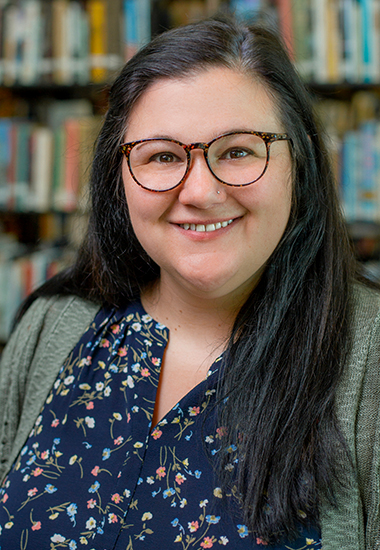Plant Biologist Sets Out to Inspire Young Scientists
 Rachel McCoy (Biology) brings her love of plants to St. Norbert as one of two new faculty members in her discipline. Her passion and much of her research centers on biochemistry, and in particular, the chemicals that plants produce. But as the instructor of Intro to Biology she’s enjoyed the chance to take a step back and experience the basics of her field all over again.
Rachel McCoy (Biology) brings her love of plants to St. Norbert as one of two new faculty members in her discipline. Her passion and much of her research centers on biochemistry, and in particular, the chemicals that plants produce. But as the instructor of Intro to Biology she’s enjoyed the chance to take a step back and experience the basics of her field all over again.
“I remember my intro to biology class and being overwhelmed by all these terms and definitions. Lately I’ve been focused on specific pathways and specific plants, so it’s nice to zoom out and get the whole picture again,” McCoy says. “I’ve always liked teaching and seeing that light go off when people understand something. And my path just cemented that. I went to a liberal arts school as an undergrad, and knew that was the place I wanted to be.”
From physics to plants
McCoy took an early interest in science, and in high school was inspired by her physics teacher to pursue physics at the University of Evansville. Then she took a biology class and made the switch. She points out that, like St. Norbert, Evansville provides a liberal arts education that gave her confidence in writing and communicating that some of her peers lacked when she studied for her doctorate at Purdue University.
At Purdue, where she spent 10 years studying, researching and writing, McCoy focused on black walnut trees. “They make a compound called juglone that they release into the soil and it kills nearby plants. So, they basically make their own herbicide,” says McCoy. I came to the topic as a bit of an accident. Plants are interesting in how they approach life way differently than animals. They don’t move around and they make their own food. And some of the ways they cope with not moving around is they make chemicals. Those chemicals are useful for us because they end up being a lot of our medicines, or herbicides like juglone.”
Her research is being continued by a new set of scholars at Purdue. McCoy is currently working on a project that’s funded by the U.S. Department of Agriculture, brought over from her post-doc position. That studies how plants use a certain chemical and how they respond to it.
First impressions
“When I came to campus, the fact that it’s on the Fox River is gorgeous. They told me how campus is an arboretum. It used to have each species of tree native to Wisconsin. I’m a plant person, so that was really interesting,” says McCoy.
She prefers to spend her time in the lab, huddled behind a microscope or examining a plant. She feels her passions energized with the fresh faces learning things that ignited her initial love for biology. She says, “They’ve been studying pond water in the lab, and I’ll hear students say: ‘Oooh, there’s something moving in here,’ or ‘hey, it’s a blood cell.’ It’s fun to hear and see their excitement for science.”
In spring semester 2023, she is teaching genetics and botany, and in the future, molecular biology. She also has future ambitions of creating a new course: “One of my missions in life is to increase people’s awareness of plants because a lot of people walk through life and don’t even notice them. I really want to offer a non-major’s class around plants and people where we would talk about all the different ways that we use plants for food and medicine, and also psychedelics and things like that.”
Confidence to be a scientist
McCoy hopes to bring a different perspective to her students, choosing to put an emphasis on plants where many think of animals when they think biology. But she also just hopes to be a great resource for her students. “I remember being a freshman, being confused how to navigate the university system. One of my goals is help students find the resources they need before it’s too late,” she says.
“I’ve been impressed with the community. It’s fun to see the relationships built between professors and students. … I want people to be able to see themselves as scientists. My dad was an accountant and my mom owns a bar. I had no idea what a scientist looked like, so I needed some support. Now that I’m here, I want to offer that support to someone else.”
Oct. 27, 2022











